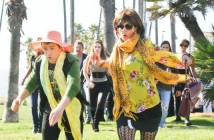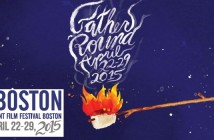Viktoria (2014)
Cast: Irmena Chichikova, Daria Vitkova, Kalina Vitkova
Director: Maya Vitkova
Country: Bulgaria | Romania
Genre: Drama
Editor’s Notes: The following review is part of our coverage for the Film Society of Lincoln Center’s Making Waves Romanian Film Festival, which runs from December 4 to December 8. For more information visit FilmLinc.com and follow FilmLinc on Twitter at @FilmLinc.
“10 years before the collapse of communism” proclaims the opening title card of Viktoria, and by the time we reach the closing credits we seem to have lived it. Bulgarian filmmaker Maya Vitkova’s debut feature is a writer-director-producer picture if ever there was one, an over-extended mess of a movie that could stand to have its luvvies cut to ribbons. Like the assembly of archival footage with which it opens, like a who’s who of world figures circa 1979, this is a collage whose effort to pack in everything serves only to squeeze out anything of interest. What it manages to say—much less what it tries to—across its two and a half hours is a mystery; maybe that, like the characters, has been left to the audience’s inference.
…this is a collage whose effort to pack in everything serves only to squeeze out anything of interest.
It is borne, to whatever limited extent it is, by the central performance of Irmena Chichikova as the adult daughter of a card-carrying party member whose contempt for the communist cohorts of her mother sees her refuse resolutely to bear a child until she’s escaped the clutches of her native land. Vitkova’s fond of a close-up, and Chichikova has the face to allow them in number; a relative newcomer, she sells the moody tone of the piece with the gaunt dispassion of her visage, all dead eyes and sunken cheeks. But two and a half hours is a long time to spend in the presence of Vitkova’s half-cooked characters, and not even the capacious bags beneath the actress’ eyes can carry that much dead weight.
 It’s not just physically the adult cast seem not to age across the course of the film’s fifteen-ish year timeline; glossing over months and then years at a time, Vitkova’s script affords her figures little ostensible evolution in the course of the drama, taking them from cardboard cut-out communists to cardboard cut-out capitalists without even the addition of corrugation. If moodily-scored close-ups of vacant stares and slow-motion sequences of all manner of odd actions—an eruption of breast milk, for instance—were the vehicle for profundity, this might just be the deepest movie ever made, but the director seems ill-able to realise that such aesthetic indulgence only exacerbates the sense of these figures as silhouettes against the shapeless mass of her haplessly-orchestrated historical backdrop.
It’s not just physically the adult cast seem not to age across the course of the film’s fifteen-ish year timeline; glossing over months and then years at a time, Vitkova’s script affords her figures little ostensible evolution in the course of the drama, taking them from cardboard cut-out communists to cardboard cut-out capitalists without even the addition of corrugation. If moodily-scored close-ups of vacant stares and slow-motion sequences of all manner of odd actions—an eruption of breast milk, for instance—were the vehicle for profundity, this might just be the deepest movie ever made, but the director seems ill-able to realise that such aesthetic indulgence only exacerbates the sense of these figures as silhouettes against the shapeless mass of her haplessly-orchestrated historical backdrop.
But the namesake, at least, does change, if chiefly to an actress of entirely inappropriate skin colour and age to follow her forebear, four years on. She is born, much to her mother’s chagrin, on the anniversary of the revolution, and instantly made an icon of the regime; it’s an ironic absurdity the movie presents in comic scenes of the nine year-old Viktoria being BFFs with General Secretary Zhivkov, but given the inescapably dour atmosphere set by the brooding mom, the hour-or-so across which these sequences take place—of course often in slow-motion—feels entirely out of place. It’s the sort of conceit that might work wonders as plain comedy; imagine it as part of the terrific Communist-era portmanteau Tales from the Golden Age, and you get a sense of the movie this might easily have been.
…two and a half hours is a long time to spend in the presence of Vitkova’s half-cooked characters, and not even the capacious bags beneath the actress’ eyes can carry that much dead weight.
But it’s too busy being eight others, and by the time it concludes few of them feel to have ended—or even started—at all. Only in the three-tiered musings on motherhood does the movie find any success, and even only fleeting; Vitkova has dedicated the film to her mother, and it’s clear at least from the finished product that it’s a dynamic she dwells on. But her facile symbolism and sloppy scripting serves it only sparely: milk isn’t so much ascribed semiotic significance as it is drenched over the film by the litre. For all the expressive aesthetic impressions—DP Krum Rodriguez is an unsung hero of the overhead shot—Viktoria is a very pretty picture with nothing much to say, and a terribly long time to say it. “Who are you?” Viktoria asks her grandmother near the end in faux-figurative whisper; damned if we know who any of these folk are.
Viktoria is a very pretty picture with nothing much to say, and a terribly long time to say it.



